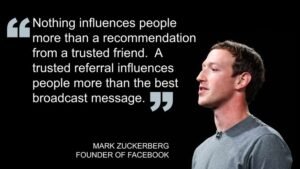The days when traditional advertising methods like TV commercials and print ads dominated the marketing sphere have gone now. Today, brands are increasingly turning to influencers for business growth. Influencers are individuals with a loyal and engaged following, who create authentic, relatable, and impactful content that resonates with consumers. Social media influencers and celebrity marketing are reshaping brand communication as these are more profit-generating than traditional methods.
This blog delves into how influencer marketing is reshaping brand communication, exploring its rise, the psychology behind its effectiveness, and its transformative impact on brand strategies.
The Rise of Celebrity & Social Media Influencer Marketing
Influencer marketing is not a new concept, but its prominence has skyrocketed in the digital age. With the advent of social media platforms like Instagram, TikTok, YouTube, and Twitter, individuals have gained the power to gather large followers and influence consumer behavior.

- From Celebrities to Micro-Influencers: Initially, brands relied on celebrities to endorse their products. However, the rise of micro-influencers (individuals with 10,000 to 100,000 followers) has shifted the focus to authenticity and relatability. Micro-influencers often have niche audiences and higher engagement rates, making them more effective for targeted campaigns.
- Social Media as a Catalyst: Platforms like Instagram and TikTok have become hubs for influencer marketing, offering brands a direct line to their target audiences. The visual and interactive nature of these platforms allows influencers to create engaging content that drives brand awareness and conversions.
Why Influencer Marketing Works: The Psychology Behind It

The success of influencer marketing lies in its ability to tap into human psychology. Here’s why it works:
- Trust and Authenticity:
Influencers are perceived as more trustworthy than traditional advertisements. Their followers view them as relatable individuals rather than corporate entities. When an influencer recommends a product, it feels like a personal recommendation from a friend. - Social Proof:
Humans look to others for guidance. When an influencer endorses a product, it serves as social proof, encouraging their followers to try it out. - Emotional Connection:
Influencers often share personal stories and experiences, creating an emotional connection with their audience. This connection translates into higher engagement and brand loyalty. - Niche Targeting:
Influencers cater to specific niches, allowing brands to reach highly targeted audiences. For example, a fitness influencer can effectively promote workout gear to health-conscious consumers.
How Influencer Marketing is Reshaping Brand Communication
1. Authenticity Over Traditional Advertising
Consumers today are increasingly skeptical of traditional advertising methods. They crave authenticity and transparency, which influencer marketing delivers. By partnering with influencers, brands can communicate their message in a way that feels genuine and relatable.
2. Storytelling Through Influencers
Influencers are master storytellers. They weave brand messages into their content seamlessly, making it more engaging and memorable.
3. Driving Engagement and Conversions
Influencer marketing excels at driving engagement and conversions. Influencers create content that encourages their followers to take action, whether it’s making a purchase, signing up for a service, or participating in a campaign.
4. Building Brand Communities
Influencers help brands build communities of loyal customers. By fostering a sense of belonging, brands can create long-term relationships with their audience.
5. Real-Time Feedback and Insights
Influencers provide brands with real-time feedback and insights into consumer preferences. This data is invaluable for refining marketing strategies and improving products.
Examples of Impactful Influencer Marketing
Social media influencers have become game-changers in driving brand awareness and movie success. Barbie movie’s influencer marketing campaign used the “This Barbie is” trend, allowing users to create personalized content, generating over 1.5 million Instagram posts and making it a cultural phenomenon before its release. Similarly, Calvin Klein’s #MyCalvins campaign turned everyday users into brand models, proving that authentic engagement can boost visibility and sales.
Daniel Wellington took a different approach, skipping traditional ads and relying on micro-influencers to create a viral movement, leading to 4,700% growth. These campaigns highlight how influencer-driven strategies not only sell products but also shape culture.
The Role of Micro-Influencers and Nano-Influencers
While mega-influencers (those with millions of followers) still play a role, micro-influencers and nano-influencers (those with 1,000 to 10,000 followers) are gaining traction.
- Higher Engagement Rates: Micro-influencers often have higher engagement rates because their followers feel a stronger connection to them.
- Cost-Effective: Collaborating with micro-influencers is more affordable, making it accessible for small and medium-sized businesses.
- Niche Expertise: Micro-influencers often specialize in specific niches, allowing brands to reach highly targeted audiences.
Challenges in Influencer Marketing
While influencer marketing offers numerous benefits, it’s not without challenges:
- Authenticity Concerns:
As influencer marketing grows, some influencers resort to fake followers and engagement, undermining trust. - Regulation and Transparency:
Governments and platforms are introducing stricter regulations to ensure transparency in influencer partnerships. - Measuring ROI:
Tracking the ROI of influencer campaigns can be challenging, especially for long-term brand-building efforts.
The Future of Influencer Marketing
The future of influencer marketing looks promising, with several trends shaping its evolution:
- Video Content Dominance:
Platforms like TikTok and YouTube are driving the demand for video content, making it a key focus for influencer campaigns. - Long-Term Partnerships:
Brands are moving away from one-off collaborations and focusing on long-term partnerships with influencers to build deeper connections. - AI and Data-Driven Strategies:
AI tools are helping brands identify the right influencers and measure campaign performance more effectively. - Sustainability and Social Responsibility:
Consumers are increasingly drawn to influencers and brands that prioritize sustainability and social responsibility.
Influencer marketing has fundamentally reshaped how brands communicate with their audiences. By leveraging the trust, authenticity, and creativity of influencers, brands can create meaningful connections with consumers, drive engagement, and build lasting loyalty.
As the digital landscape continues to evolve, influencer marketing will remain a powerful tool for brands looking to stay relevant and impactful. Whether you’re a global corporation or a small business, embracing influencer marketing can help you navigate the complexities of modern brand communication and achieve your marketing goals.

